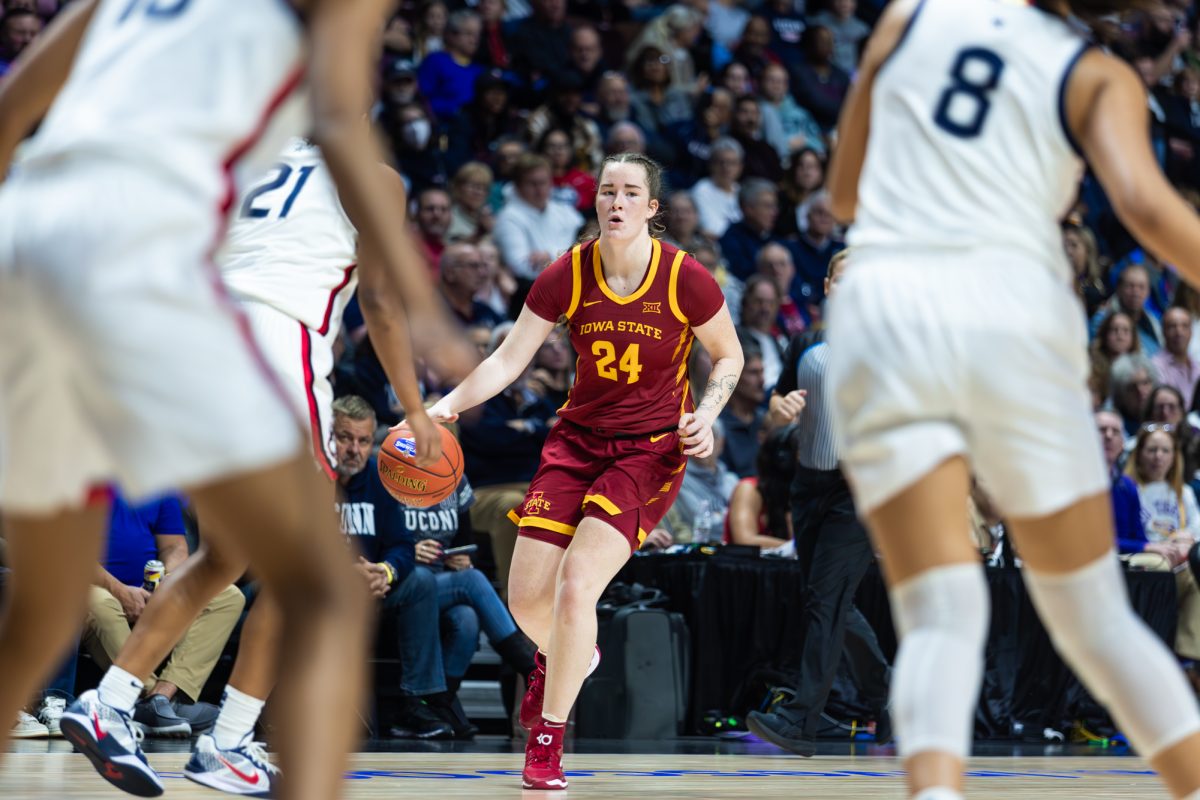COLUMN:College grads – Iowa’s main export
February 4, 2002
One of the currently vogue issues in Iowa is the “brain drain” – Iowa’s best and brightest state university graduates leaving, pursuing careers in such exotic locales as Minneapolis and Kansas City. As leaders, citizens and lawmakers lament the loss of young Iowa natives, I feel as a future graduate of a state university, I can give one response to the question of why we are leaving the state by the herd.
When I look at the future of the town where I went to high school, I see a population that is top-heavy on the elderly and pretty sparse on the young. The local Catholic school boasts elementary classes of fewer than ten students, and vacancies left by retiring teachers in the public schools are not always filled.
I see a town that can support two Dollar General Stores but couldn’t keep a Pamida or an Alco afloat, forcing those with more sophisticated discount-retail tastes to drive 25 miles to a Wal-Mart. I can watch a movie, putz around at the card rack in one of the drug stores, play bingo or shop for furniture.
The biggest employers are the school district, the hospital, the nursing homes and a recycling project that employs people with physical and mental disabilities. The community college is another big employer, churning out graduates in small marine mechanics, ag sales and nursing. Unless I want to teach school or provide health care for the elderly, there are few employment niches that would allow me to fully use the education I received at Iowa State University.
I think about my r‚sum‚, the one I handed out one November day at the College of Agriculture job fair.
Scanning my credentials, the recruiters could see I was toward the top of my agronomy class, but I had all kinds of other auxiliary experiences that seemed to detract from my ability to test soil. Foreign language proficiency, an internship in Washington, and travel abroad seemed to undermine any capacity I would have to competently take soil samples.
“You aren’t the kind of person we’re looking for,” said one recruiter. “Maybe you can use this somewhere else.”
I was too much of a risk for the local ag companies. I was someone who might not stay forever.
I look at the rural hospitals, some of which are discontinuing obstetric services. There just aren’t enough babies born in some communities to warrant offering obstetrics, forcing expectant mothers to drive even further to deliver their children. The county south of us has been forced to send its prenatal patients elsewhere, an idea thoroughly unappealing to someone considering having children in a small community.
I read all the Civil War books in the public library before my senior year.
The section of religion and philosophy books is dominated by “Chicken Soup for the Soul” and books on angels. The only books about Africa are travel guides, and periodicals are heavy on the housekeeping and light on the news.
I really loved growing up in a small town, but I just cannot bring myself to go back. It’s not that I need a town with four dollar lattes, a skyline, and a bohemian artist commune. I don’t need a Wal-Mart or a McDonald’s to feel cosmopolitan, but I could not dream of raising my kids in an area with shrinking school systems, a place where they could not interact with people of different backgrounds or professions.
I did not enroll in Iowa State University with the intention of permanently relocating to someplace outside Iowa.
So many choices seem to inadvertently exclude us from going back, whether it is the roommate who chose to become a physicist, an apparel designer, or a film-maker; marrying someone of a different racial or cultural background; or choosing to get experience through travel rather than interning at a local business.
Am I part of the problem? Is my scrutiny of my native state confirming that I do not wish to stem the migration of graduates from their home? Unfortunately, yes. I will become one of those statistics, the exodus of graduates, and remember fondly a life I had in Iowa, seeking to recreate its benefits in a place without some of its detractions.
Rachel Faber Machacha is a graduate student international development studies from Emmetsburg.






